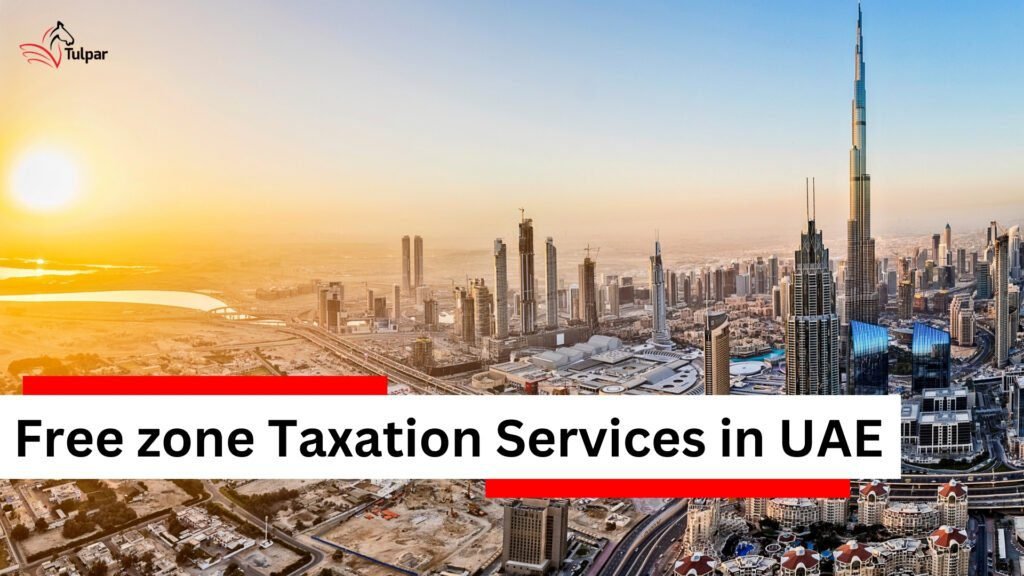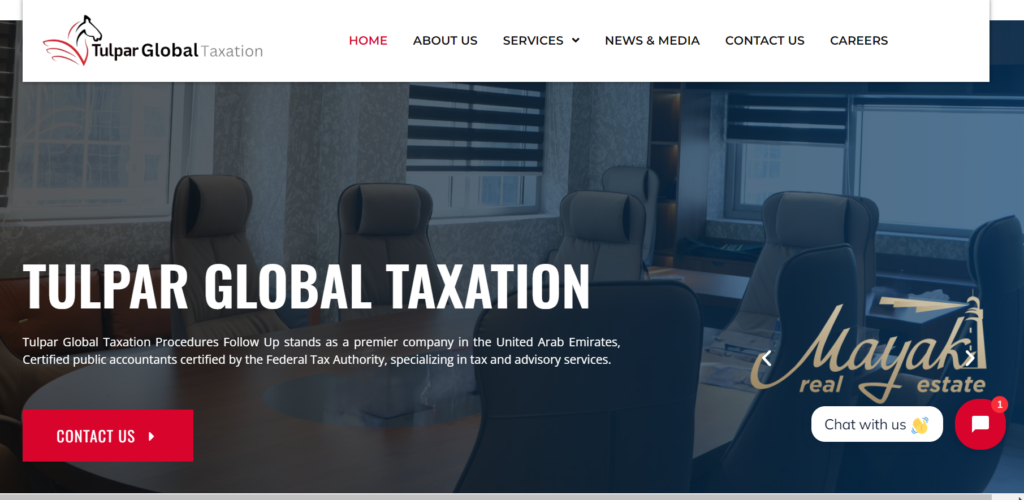
Free zone Taxation Services in UAE
Table of Contents
Related Articles


The Impact of CARF on UAE Crypto Traders | Ready to Report FTA

Feasibility Study Report Preparation in UAE

Let's Talk
Sign Up For Free Consultation
Free zone Taxation Services
In the United Arab Emirates (UAE), free zones have emerged as a significant part of the economic landscape, providing numerous advantages for businesses. Free zone companies enjoy unique taxation benefits that are tailored to encourage investment and growth. Tulpar Global Taxation Services offers comprehensive guidance on navigating the complexities of corporate tax laws and regulations for businesses operating within these zones. The corporate tax regime in the UAE is evolving, with a recently introduced corporate tax rate applicable to qualifying free zone persons.
To benefit from the 0% corporate tax rate, entities must meet certain criteria defined by the Ministry of Finance and the Federal Tax Authority. These qualifying activities often include wealth and investment management services, finance and leasing, logistics services, and other specific excluded activities. Tulpar Global Taxation Services can help identify qualifying income and determine how your business can align with the corporate tax law to maximize tax benefits.

For businesses classified as juridical persons within the UAE free zones, it is crucial to understand the implications of the new corporate tax for free zone entities. Companies must register for tax and ensure compliance with the tax period requirements. Those that fall under qualifying free zone definitions can benefit from favorable tax rates on taxable income, as defined by the latest regulations. The impact of the corporate tax in the UAE extends beyond the free zones, influencing companies operating in the mainland UAE as well. Understanding the nuances of tax registration and tax rate on qualifying income is essential for businesses to avoid penalties. Tulpar Global Taxation Services provides expertise in these areas, ensuring that businesses remain compliant and capitalize on available benefits.
Additionally, the recent introduction of a corporate tax has also led to changes in VAT applicability on goods or materials traded within the designated zone. Businesses engaging in fund management services, treasury and financing services, and other financial operations should consult with experts to navigate these changes effectively. Engaging with Tulpar Global Taxation Services for free zone taxation services ensures that your business can strategically manage its tax liabilities. By leveraging our expertise, businesses can focus on growth while ensuring compliance with the latest UAE corporate tax regulations. The complexities of corporate tax in UAE free zones require meticulous attention, and we are here to guide you through every step of the process, allowing you to harness the full potential of your operations within the UAE free zones.
Overview of UAE Corporate Tax Framework

The UAE corporate tax framework represents a significant shift in the business landscape, introduced by the new corporate tax laws. Under the UAE corporate tax regime, companies operating within the country must comply with these tax regulations, which set a corporate tax rate of 0% for qualifying activities. This structure is designed to promote investment while ensuring adequate substance in the UAE. The UAE Ministry of Finance oversees the implementation and compliance of these tax laws, ensuring that businesses are aligned with the federal corporate framework. Tulpar Global Taxation Services offers comprehensive support and guidance, helping businesses navigate this complex tax structure while maximizing tax relief opportunities.
The introduction of the new UAE corporate tax also includes specific provisions for businesses operating in free zones in the UAE. Companies can benefit from tax exemptions on certain income-generating activities, provided they meet the necessary criteria outlined in the corporate tax guide. Understanding the distinction between qualifying activities and excluded activities is crucial for effective tax planning. Tulpar Global Taxation Services provides insights and tailored strategies to help businesses optimize their operations in line with the new tax structure.
Definition of Free Zone Person

A free zone person is defined as any entity or individual conducting business activities within a designated free zone in the UAE. These entities are subject to the specific free zone corporate tax regulations, which offer unique benefits under the UAE corporate tax law. To qualify for the corporate tax rate on qualifying free zone businesses, the income derived from core income-generating activities must be in line with the regulations set by the free zone authority. This includes activities that are ancillary to the primary business functions and are considered qualifying if they are conducted within the same free zone.
For businesses engaging in transactions with natural persons or providing management services that are subject to oversight of the competent authority, it is vital to maintain an adequate substance in the UAE to retain the tax benefits offered. Activities that include reinsurance services and other core functions must align with the UAE corporate tax framework to ensure compliance and optimize tax obligations. Tulpar Global Taxation Services is equipped to assist free zone entities in understanding their obligations and identifying different tax implications of their operations, ensuring that their tax structure aligns with the new regulatory environment.
Qualifying Activities for Tax Benefits
In the context of the UAE corporate tax regime, qualifying income refers to income generated from specific activities that meet the established criteria set by the tax authorities. Businesses engaging in eligible activities can benefit from reduced corporate income tax rates. This framework is particularly beneficial for entities with foreign ownership, allowing them to optimize their tax positions while complying with the regulatory requirements of the UAE.
To qualify, businesses must demonstrate that their income is derived from tax periods that align with the corporate taxes regulations. This includes active engagements in sectors such as investment management services, where firms manage assets for clients, and financing services, which involve providing loans or capital to businesses. Tulpar Global Taxation Services assists companies in identifying and leveraging these qualifying activities to maximize tax benefits and ensure compliance.
List of Qualifying Activities
Examples of qualifying activities that can benefit from tax advantages include:
- Ownership, Management and Operation of Ships
- Fund, Wealth and investment management services
- Reinsurance Services
- Financing & Leasing of Aircraft
- Headquarter Services to Related Parties
These activities are subject to the corporate tax rate established by the UAE tax framework, facilitating business growth and compliance.
Examples of Excluded Activities
Conversely, it is crucial for businesses to recognize the excluded activities that do not qualify for tax benefits. Such Non-Qualifying Revenues may include:
- Immovable Property: Income derived from real estate transactions is generally excluded.
- Passive Income: Revenues from investments or assets that do not involve active business operations are not considered qualifying.
- Capital Gains: Profits from the sale of assets, unless under specific conditions, are excluded from qualifying income.
- Intellectual Property Assets: Income generated solely from the licensing of intellectual property may not qualify.
In addition, activities classified under permanent establishment may not benefit from reduced tax rates. For instance, companies operating in areas like the Jebel Ali Free Zone need to ensure their operations comply with the competent authority guidelines to avoid falling under non-qualifying activities. Tulpar Global Taxation Services provides expert guidance on identifying taxable person statuses and understanding the implications of non-resident person classifications to help businesses navigate these complexities effectively. By ensuring compliance with the tax rate structures, companies can strategically plan their operations and tax liabilities.
Understanding Qualifying Income
Qualifying income refers to the revenue that businesses generate through activities recognized by the UAE’s corporate tax rules as eligible for tax benefits. This includes income from UAE Free Zones where companies can operate with significant tax advantages. Businesses must ensure their income aligns with the compliance requirements established by the tax authorities to qualify for corporate tax relief. Activities generating Qualifying Intellectual Property income, such as royalties from patents or trademarks, also fall under this category, provided they adhere to specific regulations.
Understanding the parameters defining qualifying income is crucial for effective financial planning and tax planning strategies. For instance, mainland companies often face different tax obligations compared to those operating in free zones, impacting their overall financial health. Tulpar Global Taxation Services assists clients in navigating these distinctions to optimize their tax positions.
De Minimis Requirement
The De Minimis requirement is an essential threshold that specifies a minimum level of qualifying income a business must achieve to qualify for certain tax benefits. This requirement is particularly relevant for entities engaged in immovable property transactions or other activities generating minimal revenue. Businesses must maintain careful records to ensure they meet this threshold, as failure to do so can lead to unintended tax consequences.
This requirement emphasizes the need for robust internal procedures to track income sources and categorize them appropriately. Tulpar Global Taxation Services provides comprehensive support to clients, ensuring they understand the regulatory oversight related to the De Minimis requirement and maintain compliance.
Importance of De Minimis in Tax Liability
Understanding the importance of the De Minimis requirement in tax liability is critical for companies, particularly those with a diverse customer base and varying income streams. Failing to meet the De Minimis threshold can result in a business being subjected to standard corporate tax rates, which may significantly increase their overall tax burden. This underscores the necessity for effective tax compliance and meticulous tracking of income.
Companies engaged in multiple business operations, including those dealing with commercial properties, should prioritize this requirement to maintain favorable tax statuses. By aligning their business activities with the De Minimis thresholds, they can protect themselves from excessive tax liabilities. Tulpar Global Taxation Services works with clients to develop tailored strategies that ensure compliance with De Minimis while maximizing benefits under the corporate tax regime.
Consequences of Non-Compliance
The consequences of non-compliance with the De Minimis requirement can be severe. Companies that fail to meet the necessary thresholds may face increased scrutiny from tax authorities, potentially leading to audits and penalties. Non-compliance can jeopardize a business’s eligibility for tax benefits, making it essential for companies to adhere to the corporate tax rules established by the ministerial decision.
In addition, failing to file an accurate corporate tax return can lead to legal repercussions and adversely affect the ownership of companies involved in non-compliant activities. Foreign entities operating in the UAE must also be cognizant of these risks, as non-compliance can complicate their business dealings and financial planning efforts. Tulpar Global Taxation Services is dedicated to helping businesses navigate the complexities of compliance, ensuring they remain in good standing while optimizing their tax strategies.
Operational Advantages of Free Zones
Free zones in the UAE offer significant operational advantages for businesses looking to establish a presence in the region. These areas are designed to foster business communities by providing an environment conducive to growth and development. One of the most appealing aspects of free zones is the 100% capital and profit repatriation, allowing businesses to retain full control of their earnings. This feature is particularly beneficial for investment planning and supports offshore tax planning strategies, enabling companies to operate efficiently within the UAE market.
Additionally, free zones provide efficient infrastructure that facilitates seamless operations, making it easier for businesses to engage in transactions in relation to their goods and services. Companies in these zones enjoy reduced customs duty, enhancing their competitive advantage in the region. Tulpar Global Taxation Services helps clients leverage these operational benefits by guiding them through the specific regulatory frameworks associated with free zone operations.
100% Capital and Profit Repatriation
One of the most significant advantages of operating in UAE free zones is the 100% capital and profit repatriation policy. This allows foreign investors to transfer their full profits back to their home countries without any restrictions. Such freedom is particularly attractive to businesses looking to maximize their returns and ensure that their profits are not subjected to local taxation.
This policy encourages more foreign direct investment and enhances the UAE’s position as a global business hub. By enabling businesses to maintain full control over their finances, free zones promote a favorable climate for investment planning. Tulpar Global Taxation Services provides expert advice on capital repatriation strategies, ensuring compliance with all relevant regulations.
Tax Exemptions Overview
Tax exemptions are a key incentive for companies operating in UAE free zones. These exemptions often include the UAE Corporate Tax for Free Zone businesses, allowing companies to enjoy tax relief for an extended period, typically ranging from 15 to 50 years, subject to renewal. Free zone companies are often exempt from business taxes, including withholding tax, on most forms of income, making them an attractive option for startups and SMEs.
Furthermore, businesses benefit from reduced customs duty on imports and exports, which enhances their profitability. It is crucial for companies to understand the specific relevant tax period and the scope of their exemptions to maximize their benefits. Tulpar Global Taxation Services specializes in helping businesses navigate these tax exemptions, ensuring they fulfill their tax returns and meet all compliance requirements.
Streamlined Business Setup Processes
The streamlined business setup processes in UAE free zones simplify the incorporation and operational initiation for new ventures. This efficiency allows businesses to establish a legal entity quickly and begin operations without the usual bureaucratic delays. The free zones provide a one-stop-shop for various services, including licensing, permits, and registration, which significantly reduces the time and effort involved in starting a business.
This streamlined approach is particularly beneficial for SMEs about compliance, as it minimizes the administrative burden on small and medium-sized enterprises. Tulpar Global Taxation Services offers tailored solutions to assist businesses in navigating these processes, ensuring accurate VAT returns and compliance with all necessary regulations. The combination of operational advantages, tax relief, and efficient setup processes makes UAE free zones an ideal choice for businesses looking to thrive in a dynamic market while enjoying lifestyle benefits unique to the region.
Potential Disadvantages of Free Zone Status
While operating within a free zone offers numerous benefits, there are also potential disadvantages that businesses must consider. One significant concern is the tax treatment of income derived from activities that fall outside the scope of the free zone’s regulations. Companies must be cautious to ensure that their business activities remain compliant with the List of business activities approved by the free zone authority. Engaging in activities not aligned with these regulations can lead to challenges in obtaining the desired tax benefits.
Limitations on Business Activities
While operating within a free zone offers numerous benefits, there are also potential disadvantages that businesses must consider. One significant concern is the tax treatment of income derived from activities that fall outside the scope of the free zone’s regulations. Companies must be cautious to ensure that their business activities remain compliant with the List of business activities approved by the free zone authority. Engaging in activities not aligned with these regulations can lead to challenges in obtaining the desired tax benefits.
Impact on Market Access
Another potential disadvantage of free zone status is the impact on market access. Companies operating solely within free zones often face restrictions on trading directly with the UAE mainland. This limitation can hinder growth opportunities and access to a broader customer base. Non-FZ persons and businesses may not find it easy to establish partnerships or engage in transactions with companies in the free zone, affecting their overall market competitiveness. Understanding these dynamics is crucial for strategic planning, and Tulpar Global Taxation Services can provide guidance on how to navigate these challenges.
Navigating Exemptions
Navigating exemptions related to VAT service and other tax benefits can be complex for free zone companies. While businesses can enjoy certain tax exemptions, ensuring compliance with the regulations governing these exemptions is essential. Companies must be vigilant about the specific conditions attached to their tax relief, particularly regarding the treatment of income derived from various activities. Tulpar Global Taxation Services helps clients understand and optimize these exemptions to maintain compliance and enhance their financial standing.
Understanding Transfer Pricing Regulations
Transfer pricing regulations are another critical aspect that free zone companies must navigate. These regulations dictate how transactions between related parties are valued, ensuring that income is reported accurately for tax purposes. Understanding these rules is vital, especially for companies engaging in reinsurance activities or other cross-border transactions. Failing to adhere to these regulations can result in penalties and complications with tax authorities. Tulpar Global Taxation Services offers comprehensive support to ensure businesses understand and comply with these requirements.
Definition and Importance
Economic substance regulations require that businesses maintain a sufficient level of physical presence and activity within the UAE to justify their tax benefits. This means that companies must demonstrate that they are not merely using the free zone status for non-qualifying income and must comply with the non-qualifying income de minimis test to avoid losing their tax advantages. The importance of these regulations cannot be overstated, as they ensure that companies contribute fairly to the UAE economy while benefiting from its favorable tax environment.
Importance of Compliance for Businesses

Compliance with tax regulations is crucial for businesses operating in free zones. Maintaining adherence to the regulations surrounding economic substance, transfer pricing, and the treatment of income is essential for avoiding penalties and ensuring continued eligibility for tax benefits. Companies must establish robust accounting practices to monitor their financial activities and ensure compliance with all relevant laws. Tulpar Global Taxation Services specializes in assisting businesses with their compliance requirements, helping them navigate the complexities of operating within a free zone.
Implications of Non-Compliance
The implications of non-compliance can be severe, including significant financial penalties and loss of tax benefits. Companies that fail to meet the necessary regulatory standards may find themselves facing audits from tax authorities, which could lead to reputational damage and operational disruptions. Understanding the consequences of non-compliance is vital for businesses to protect their interests and maintain their standing within the UAE corporate landscape. Tulpar Global Taxation Services provides expert guidance to help businesses stay compliant and mitigate these risks.
Conclusion and Future Considerations
In conclusion, while free zone status presents numerous opportunities, businesses must remain vigilant regarding the potential disadvantages associated with it. Limitations on business activities, market access challenges, and the need for compliance with tax regulations underscore the importance of strategic planning and informed decision-making. Companies should work closely with experts like Tulpar Global Taxation Services to navigate the complexities of operating within a free zone effectively. As the regulatory landscape evolves, staying informed and adaptable will be key to leveraging the advantages of free zones while mitigating potential risks.
